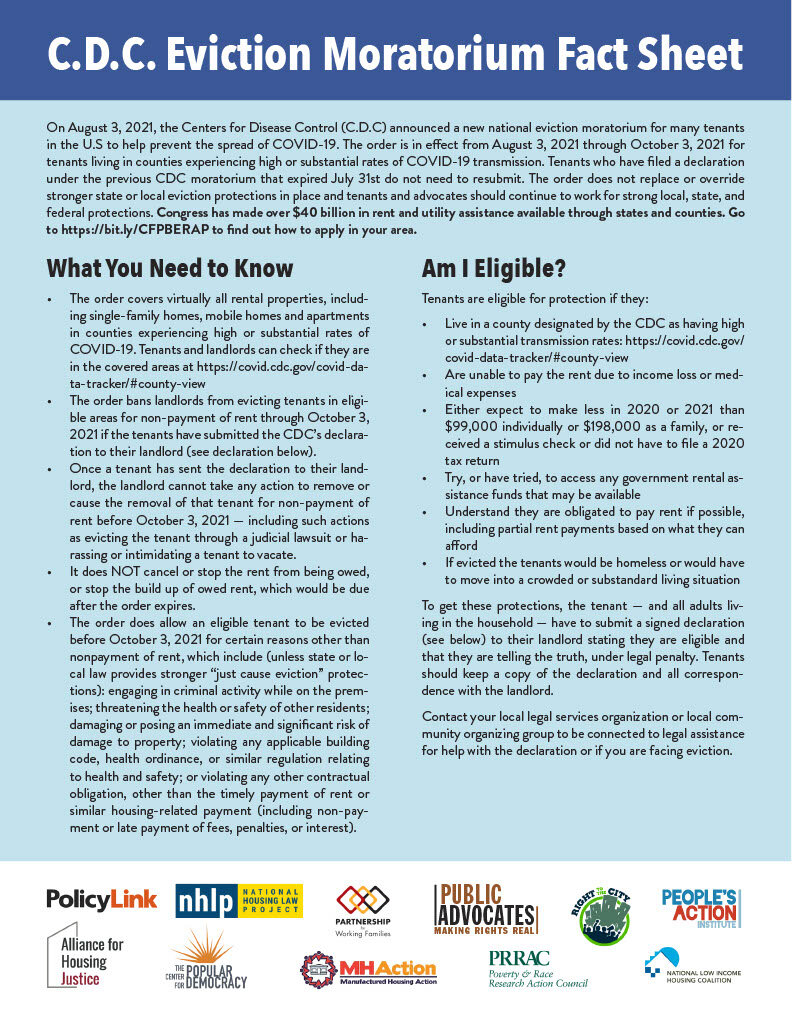
Sharks in the Water: Renters on the Limits of Emergency Rental Assistance
As of summer 2022, the National Equity Atlas reported that rent debt was at “crisis levels.” Renter households collectively owe almost, at minimum, a massive $15 billion in back due rent. These households are overwhelmingly occupied by low-income renters of color. This report describes renters’ experiences to highlight outstanding problems with the ERA implementation process. In particular, we share how corporate landlords have abused the system for profit. Though rent relief was supposed to combat housing insecurity, many landlords took the money and still evicted renters or lied about receiving the ERA money to collect payouts from both ERA and renters.

2022 Eviction Defense Toolkit
As of January 2022, over 9.9 million renters are behind in rent, and at risk of losing their homes. After 2 years of a pandemic, there are currently no federal eviction protections, and very few state protections. As we have during the pandemic, we are encouraging tenants who are at risk of eviction to organize collectively, build coalitions with local community organizations, create Eviction Defense Networks, access legal support, and advocate for policies to protect renters at risk of eviction.

2022 Federal Housing Policy Priorities: July Update
Even before the COVID-19 pandemic revealed the fragility of a range of U.S. institutions, from our healthcare system to our meager social safety net, the U.S. faced a crisis in housing affordability. In 2008, the bursting of a housing bubble created by a deregulated financial industry offering predatory subprime loans and inscrutable financial instruments destroyed the financial stability of millions. The foreclosure crisis, and the financial crisis that followed, cost American households $16 trillion in wealth as millions lost their homes and saw their savings and retirement funds depleted. Black and Latinx households were hardest hit, losing half their wealth.

Social Housing For All: A Vision for Thriving Communities, Renter Power, and Racial Justice
America’s rising rents and increasingly unaffordable housing costs are infamous, epic—and deeply felt by millions of families in every corner of the country. At the root of our housing problems is a corporate stranglehold over all aspects of housing finance, production, and provision—as well as over our nation’s housing policy-making. Now more than ever, all levels of government must step up to produce the deeply and permanently affordable housing that we need.

C.D.C. Eviction Moratorium Fact Sheet
On August 3, 2021, the Centers for Disease Control (C.D.C) announced a new national eviction moratorium for many tenants in the U.S to help prevent the spread of COVID-19. The order is in effect from August 3, 2021 through October 3, 2021 for tenants living in counties experiencing high or substantial rates of COVID-19 transmission. Tenants who have filed a declaration under the previous CDC moratorium that expired July 31st do not need to resubmit. The order does not replace or override stronger state or local eviction protections in place and tenants and advocates should continue to work for strong local, state, and federal protections.
Congress has made over $40 billion in rent and utility assistance available through states and counties. Go to https://bit.ly/CFPBERAP to find out how to apply in your area.

Are you facing eviction because you can’t pay rent?
The Consumer Financial Protection Bureau can help you locate rental assistance in your area. Visit the CFPB website to learn more.
If you have received an eviction notice from your landlord, get legal help immediately. The Legal Services Corporation can help you find free/low-cost legal aid in your area.
